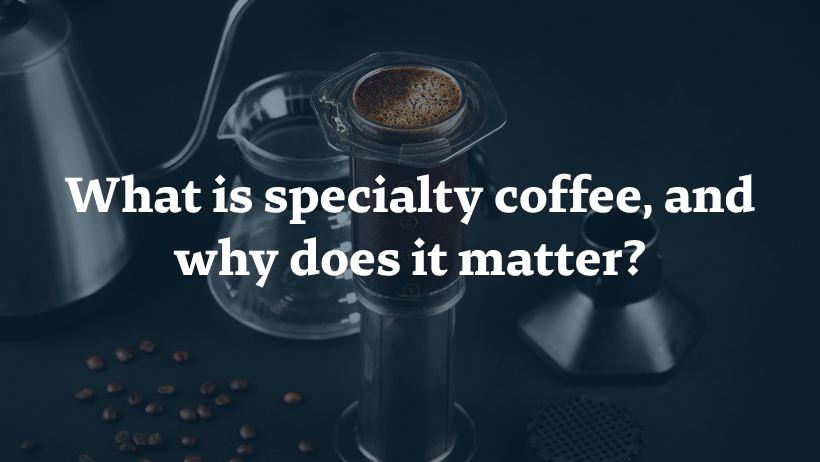
What is Specialty Coffee? Why Ruebush Coffee is Different
Share
Coffee isn’t just coffee. Around the world, millions of cups are brewed every day, but only a small percentage comes from what’s known as specialty coffee—the highest standard of quality. At Ruebush Coffee Roasters, every bean we roast falls into this category, scoring between 82 and 88 points on the Specialty Coffee Association (SCA) scale, with an average of 85.
In this post, we’ll explore what makes coffee “specialty,” how it’s scored, and why it matters. Along the way, we’ll spotlight three of our favorite single origin coffees—Kenya, Colombia, and Ethiopia—that embody the heritage, care, and flavor of true specialty coffee.
What Does Specialty Coffee Mean?
The term specialty coffee comes from the Specialty Coffee Association (SCA), the global authority that sets quality standards for coffee. To be considered specialty grade, coffee must score 80 points or higher on the SCA’s rigorous 100-point scale.
That means fewer defects, higher quality beans, and exceptional cup character. Less than 10% of the world’s coffee qualifies as specialty grade, making it rare and highly valued.
Specialty coffee is about more than flavor—it’s about traceability, sustainability, and care at every step, from farm to roaster to cup.
How Coffee is Scored
Coffee scoring is based on professional evaluations called cuppings, where trained tasters grade beans across multiple categories:
- Fragrance & Aroma – how the beans smell dry and brewed
- Flavor – the overall taste impression
- Acidity – brightness and liveliness in the cup
- Body – texture and weight of the coffee
- Balance – harmony between flavor elements
- Sweetness & Aftertaste – clean, pleasant finish
- Uniformity & Clean Cup – consistency across multiple samples
The scoring system looks like this:
- 80–84.99: Very Good (entry-level specialty)
- 85–89.99: Excellent specialty coffee
- 90+: Outstanding, extremely rare
Most coffees on grocery store shelves fall below 80 points, disqualifying them as specialty. By contrast, Ruebush Coffee averages 85 points, placing us firmly in the excellent range.
Ruebush Coffee Scores: 82–88 (Average 85)
At Ruebush Coffee, every coffee we source and roast is specialty grade, with scores ranging between 82 and 88.
- Our lowest-scoring beans (82) are still specialty grade—clean, flavorful, and carefully processed.
- Our highest scorers (88) rank among the world’s excellent coffees, delivering complex and memorable cups.
- With an average score of 85, we consistently deliver coffees that are above the baseline for specialty.
Unlike many brands that use vague terms like “premium” or “gourmet,” we believe in transparency. Sharing our scores openly builds trust and shows our commitment to quality.
Featured Single Origin: Kenya Nyeri Othaya
Altitude: 1,700–1,890 meters
Varietals: SL28, SL34, Ruiru 11, Batian
Process: Fully washed, dried on raised beds
Roast: Light–medium
From the famed Nyeri County in Kenya, this coffee showcases why the region is considered one of the world’s finest. The high-altitude slopes of Othaya and meticulous washed processing create a cup bursting with bright acidity, notes of orange and lemon, delicate florals, and an effervescent sparkle.
It’s a perfect example of how specialty coffee scoring in the mid-to-high 80s translates into vibrancy and elegance in the cup.
➡ Shop Kenya Single Origin Coffee
Specialty Coffee vs Regular Coffee
So what sets specialty apart from the coffee most people drink?
-
Regular / Commodity Coffee
- Often scores below 80
- Mass-produced, lower quality beans
- Multiple defects, inconsistent flavors
- Pre-ground, stale before it reaches your cup
-
Specialty Coffee
- Scores 80+ on the SCA scale
- Carefully sourced and traceable to farm or region
- Fewer defects, clean flavors, higher complexity
- Roasted in small batches for freshness
Some brands use the term “gourmet coffee” loosely, but only coffees evaluated at 80 points or higher earn the designation of specialty coffee.
Why Specialty Coffee Matters
Specialty coffee is about more than flavor—it’s about values.
- Better Taste – Specialty coffees deliver clarity, sweetness, and distinctive flavors, whether citrus-bright Kenyan beans or smooth Colombian chocolate notes.
- Consistency – Specialty standards ensure every cup is free of defects and balanced.
- Farmer Impact – Growers are paid more for quality, supporting sustainable practices and fairer livelihoods.
- Consumer Confidence – You know exactly where your beans come from and how they were produced.
When you drink specialty coffee, you’re not only enjoying a better cup—you’re supporting a better coffee system.
Featured Single Origin: Colombia Medellín Antioquia
Altitude: 1,300–1,500 meters
Region: Antioquia, volcanic soils
Process: Fully washed, solar-dried
Roast: Medium
Colombia is synonymous with balanced, approachable coffee, and our Medellín single origin from Antioquia proves why. Produced by smallholder farmers in rich volcanic soils, this coffee offers dried orange and ripe berries layered over smooth chocolate undertones.
Scoring in the mid-80s, it’s a vibrant yet comforting brew—a true reflection of Colombian tradition and terroir.
➡ Shop Colombia Single Origin Coffee
The Ruebush Coffee Difference
Our goal isn’t to chase ultra-rare 90+ “competition coffees.” Instead, we focus on offering coffees that are:
- Consistently excellent (82–88, avg 85)
- Carefully sourced from farmers who share our values
- Small-batch roasted for freshness and character
- Accessible to anyone who wants to experience true specialty coffee
This balance of transparency, heritage, and craftsmanship makes Ruebush Coffee approachable for new drinkers while still exciting for seasoned enthusiasts.
How to Experience Specialty Coffee at Home
The beauty of specialty coffee is that you can enjoy it daily at home with just a little care:
- Grind Fresh – Whole beans ground just before brewing preserve flavor.
- Use Good Water – Filtered water makes a big difference.
- Measure Properly – Aim for about 1:16 coffee-to-water ratio.
- Experiment with Methods – Pour-over, French press, AeroPress, or espresso each highlight different flavors.
- Taste Thoughtfully – Try side-by-side tastings, especially with our Sample Packs or Single Origins.
Coffee becomes more than a caffeine boost—it becomes a ritual of discovery.
Featured Single Origin: Ethiopia Sidama Natural
Altitude: 1,700–1,900 meters
Varietals: Indigenous heirloom
Process: Natural, hand-sorted, raised-bed dried
Roast: Medium-light
Ethiopia is the birthplace of coffee, and our Sidama Natural celebrates that heritage with a fruit-forward, complex cup. Expect bright fruit layered over milk chocolate and caramel sweetness, with a clean, memorable finish.
Scoring between 85–87, this coffee highlights the elegance and diversity of specialty coffee at its finest.
➡ Shop Ethiopia Single Origin Coffee
FAQs About Specialty Coffee
What makes coffee “specialty grade”?
Specialty coffee must score 80 points or higher on the SCA scale. Scores are based on aroma, flavor, body, balance, and overall quality, with minimal defects.
Is an 82 coffee still good?
Yes. An 82 is specialty grade—clean, flavorful, and above commodity quality. While an 88 might be more complex, an 82 still delivers a consistently excellent cup.
What’s the difference between specialty and gourmet coffee?
“Gourmet” is a marketing term with no official definition. Specialty is a certified grade based on SCA scoring.
Why is specialty coffee more expensive?
Because it’s rarer, requires more care, and rewards farmers for quality. Specialty represents only about 10% of global coffee production.
How can I tell if my coffee is really specialty grade?
Look for transparency: origin details, processing method, roast style, and scores. Brands like Ruebush Coffee share this information openly.
Conclusion: Taste the Difference
Specialty coffee isn’t just about labels—it’s about quality, transparency, and heritage. At Ruebush Coffee Roasters, every bean we roast is specialty grade, scoring 82–88 with an average of 85.
✨ Want to taste it yourself? Start with one of our Sample Packs or dive right into a Single Origin like Kenya, Colombia, or Ethiopia.
Experience the difference specialty coffee makes—one cup at a time.
